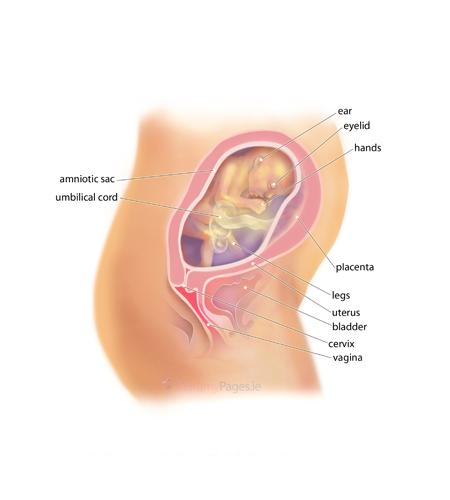Week 24 is here and your baby is getting bigger and smarter by the minute. Your baby’s brain is rapidly developing and his lungs are starting to mature. Your belly is also getting bigger minute by minute; or at least you may feel that way. An important blood test should happen sometime around the 24th week. Read on!

Your Baby this Week

Your baby is now around the size of a papaya.
Most of the weight gain now is muscle and fat deposits that will soon fill out all the wrinkles in his skin. At about 30cm (12 inches) long now, your baby is really utilising the space in your abdomen. And, as he continues to grow, your baby will do less swimming around and more punching and kicking!
Your baby’s brain is in a state of rapid development at this time. His lungs continue to gradually open and are developing the branch-like structure that will be the bronchial tubes. Additionally, the cells of the lungs are now producing surfactant, which is a substance that will allow the lungs to inflate once your baby breathes his first breath. Your baby’s skin is still mostly transparent, but cells are producing pigment, so it won’t be long until the skin looks less translucent.
If you have had Braxton Hicks contractions, you’ve probably wondered if your baby can feel them. Many women will experience Braxton Hicks contractions during the second trimester of pregnancy. Braxton Hicks contractions are a tightening in the uterus. This is a common side effect and do not cause any changes to the cervix. Although these little contractions can sometimes be sharp enough to take your breath away, don’t worry. Your baby is more than likely not even aware of it.
Your Body this Week

It’s now week 24 and you are really seeing changes to your tummy now. Your fundus (the top of your uterus) is now above your belly button and you definitely need maternity clothes by now.
Many doctors suggest that a glucose tolerance test (OGCT/OGTT) be done sometime between the 24th week and the 28th week. This is a blood test that detects gestational diabetes, which is the body’s inability to create and use insulin properly resulting in a build-up of glucose in the body. Gestational diabetes can be dangerous to an unborn baby when not properly treated. Babies born to mums with gestational diabetes are usually larger than they should be because the excess glucose turns to an overabundance of fat which is delivered to the baby through the placenta. Large babies are at risk of malformation of the bones, breathing problems, and weight problems as an adult. In addition to these added risks, babies that are large due to gestational diabetes are usually delivered C-section as the large size can cause injuries to the baby or mum during natural birth.
Only a small proportion of women will develop gestational diabetes during their pregnancy (it’s more common on women with a BMI of more than 30). Additionally, once the woman delivers the baby, the diabetes subsides. There is a greater chance that the woman will develop type-2 diabetes in the future but the added risk is low. If your doctor tells you that you have gestational diabetes, don’t panic. The condition is completely treatable but will require you to make some lifestyle changes. You must eat a diet that is designed to maintain low levels of sugar in your blood, get daily exercise, and closely monitor your weight.









